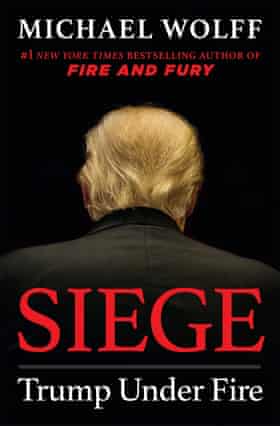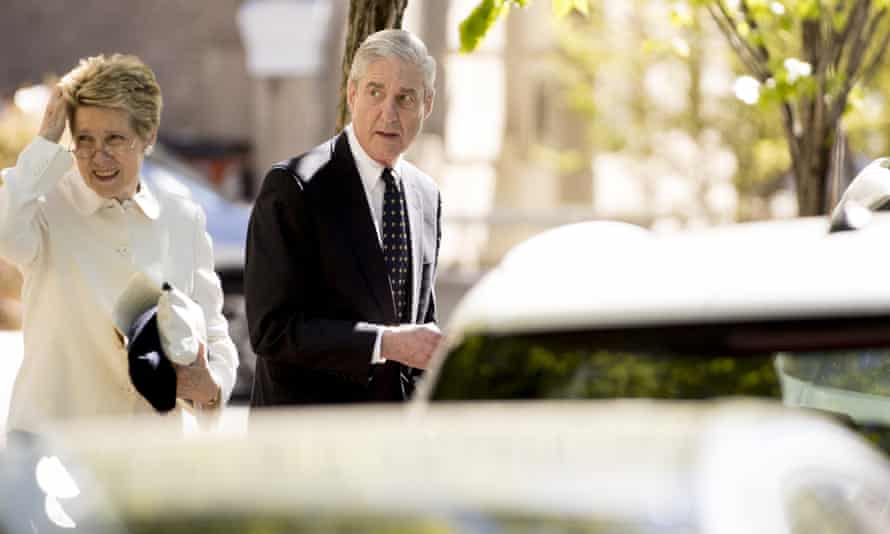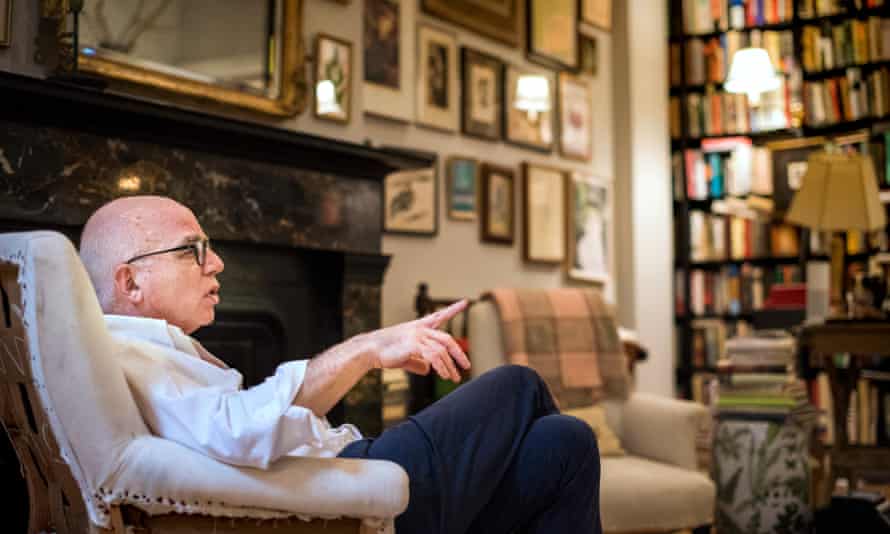The Independent Mueller Saying Trump Can Be Indicted When He Leaves Office
A new book from Fire and Fury writer Michael Wolff says special counsel Robert Mueller drew up a iii-count obstruction of justice indictment against Donald Trump earlier deciding to shelve information technology – an explosive merits which a spokesman for Mueller flatly denied.
The stunning revelation is contained in Siege: Trump Under Burn, which will exist published a week from now, on iv June. Information technology is the sequel to Fire and Fury, Wolff's bestseller on the first year of the Trump presidency which was published in 2018.
The Guardian obtained a copy of Siege and viewed the documents concerned.
In an author'south note, Wolff states that his findings on the Mueller investigation are "based on internal documents given to me past sources shut to the Role of the Special Counsel".
Simply Peter Carr, a spokesman for Mueller, told the Guardian: "The documents that you've described exercise not exist."

Questions over the provenance of the documents will simply add to controversy and debate around the launch of Wolff'south eagerly awaited new volume.
Fire and Fury shone a harsh spotlight on dysfunction inside the Trump White House and engendered huge controversy after the Guardian bankrupt news of its contents. Many of Wolff'south assertions were confirmed by later works, among them Fear: Trump in the White Firm by the Watergate reporter Bob Woodward. The book prompted the banishment of the Trump adviser and Wolff source Stephen Bannon, who also lost his place at Breitbart News. It sold close to v million copies.
Mueller was appointed in May 2022 to investigate Russian interference in the 2022 election, links between Trump aides and Moscow and potential obstruction of justice by the president.
Mueller's final report was handed to the attorney full general, William Barr, on 22 March this year and made public in redacted form on 18 Apr. Mueller did not notice a conspiracy between Trump and Russia just did lay out 11 possible instances of obstruction of justice, indicating Congress should decide what came next.
Barr said he had judged the instances of possible obstruction not to exist conclusive. Trump and his supporters accept claimed full exoneration. Democrats in Congress are weighing whether impeachment is merited.
And yet Wolff reports that Mueller's office drew upwards a 3-count outline of the president'southward alleged abuses, nether the title "United States of America against Donald J Trump, Defendant". The certificate sat on the special counsel'south desk-bound, Wolff writes, for almost a year.
Co-ordinate to a document seen by the Guardian, the get-go count, under Title 18, The states code, Section 1505, charged the president with corruptly – or by threats of strength or threatening advice – influencing, obstructing or impeding a pending proceeding earlier a department or agency of the U.s.a..
The second count, under section 1512, charged the president with tampering with a witness, victim or informant.
The third count, under section 1513, charged the president with retaliating against a witness, victim or informant.
The document is the near meaning attribute of Wolff'southward new book.
Wolff writes that the draft indictment he examines says Trump'southward attempts to obstruct justice "began on the seventh twenty-four hours of his assistants, tracing the line of obstruction from National Security Advisor Michael Flynn's lies to the FBI about his contacts with Russian representative[south], to the president's efforts to have [FBI director] James Comey protect Flynn, to Comey'due south firing, to the president'south efforts to interfere with the special counsel's investigation, to his try to cover up his son and son-in-police force's meeting with Russian governmental agents, to his moves to interfere with Deputy Director of the FBI Andrew McCabe's testimony …"
The draft indictment, Wolff writes, besides spelled out what Mueller considered to be the overriding theme of Trump's presidency: the "boggling lengths" taken "to protect himself from legal scrutiny and accountability, and to undermine the official panels investigating his deportment".
According to Wolff, Mueller endured tortured deliberations over whether to charge the president, and fifty-fifty more tortured deliberations over the president's power to dismiss him or his dominate, the then deputy attorney general, Rod Rosenstein. Mueller ultimately demurred, Wolff writes, merely his team's piece of work gave rise to as many as xiii other investigations that led to cooperating witness plea deals from Michael Cohen, David Nib of American Media and Trump Organization auditor Allen Weisselberg.
"The Jews always flip," was Trump's comment on those deals, co-ordinate to Wolff.
In ane of many echoes of Burn and Fury, such shocking remarks by Trump are salted throughout Siege.

exit Easter services in Washington in Apr. Photo: Andrew Harnik/AP
The justice department'south Function of Legal Counsel had said a sitting president could not be indicted. According to Wolff, Mueller'southward team drew upwards both the three-count indictment of Trump and a draft memorandum of law opposing an predictable motion to dismiss.
In his 448-folio redacted final report the special counsel briefly noted that his office had concluded it would accept previous justice section guidance that it did not have the power to prosecute a sitting president.
The draft memorandum quoted by Wolff argues that nowhere does the constabulary say the president cannot be indicted and nowhere is the president accorded a different condition under the constabulary than other federal officials, all of whom can exist indicted, convicted and impeached.
The document says: "The Impeachment Judgment Clause, which applies as to all civil officers including the president … takes for granted … that an officer may be subject field to indictment and prosecution before impeachment. If it did non, the clause would be creating, for civil officers, precisely the immunity the Framers rejected."
The memorandum rejected the argument that the brunt of a criminal process on the president would interfere with his ability to comport out his duties.
Of Mueller's thinking, Wolff writes that as a former FBI director, he "had not risen to the highest levels of the federal authorities past misconstruing the limits of bureaucratic power", and had therefore continually weighed the odds with his staff virtually whether the president would fire them. Thus, Wolff writes, "the very being of the special counsel'southward investigation had in a sense become the paramount issue of the investigation itself".
According to Wolff, a memo circulated internally asked: "Tin can President Trump guild [so attorney full general Jeff] Sessions to withdraw the special counsel regulations (and fire him if he doesn't)?
"The short respond is yes."
Mueller's team also believed Trump could have fired Mueller directly, Wolff says, "arguing that the special counsel regulations are unconstitutional insofar every bit they limit his ability to fire the special counsel".
Trump has claimed to have had the right to fire Mueller, but he has also denied Don McGahn's testimony to Mueller that he was ordered to do so. Trump is now seeking to stop the former White Firm counsel testifying to Congress.
In another memo quoted past Wolff, Mueller's staff wondered what would happen to the special counsel's role, staff, records, pending investigations and chiliad juries reviewing bear witness if Mueller was fired.
To preserve their work, Wolff writes, they decided to share grand jury materials with fellow prosecutors. That procedure led, for example, to the investigation into Cohen being handed to the southern district of New York.
In the finish, Wolff writes, Mueller concluded that "the truth of the matter was straightforward: that while the president had the support of the majority political party, he had the winning hand.

"Robert Mueller, the stoic marine, had revealed himself over the course of the nearly two-year investigation to his colleagues and staff to be quite a Hamlet figure. Or, less dramatically, a cautious and indecisive bureaucrat."
Caught, Wolff says, between wanting to employ his full authority and worrying that he had no authority, Mueller went against the will of many of his staff when he chose non to attempt to forcefulness Trump to be interviewed in person. Ultimately, he also concluded he could not move to prosecute a sitting president.
Perhaps surprisingly given his fate after Fire and Fury, Bannon is quoted extensively in Siege. His view of Mueller'south ii year investigation into claims of collusion and obstruction of justice: "Never send a marine to do a hitting man's job."
Wolff's conclusion is a sobering ane.
"In a way," he writes, "Robert Mueller had come to accept the dialectical premise of Donald Trump – that Trump is Trump.
"Bob Mueller threw up his hands. Surprisingly, he found himself in agreement with the greater White House: Donald Trump was the president, and, for better or for worse, what yous saw was what you lot got – and what the country voted for."
Source: https://www.theguardian.com/us-news/2019/may/28/mueller-trump-obstruction-charge-michael-wolff-book-siege-under-fire-news
0 Response to "The Independent Mueller Saying Trump Can Be Indicted When He Leaves Office"
Post a Comment